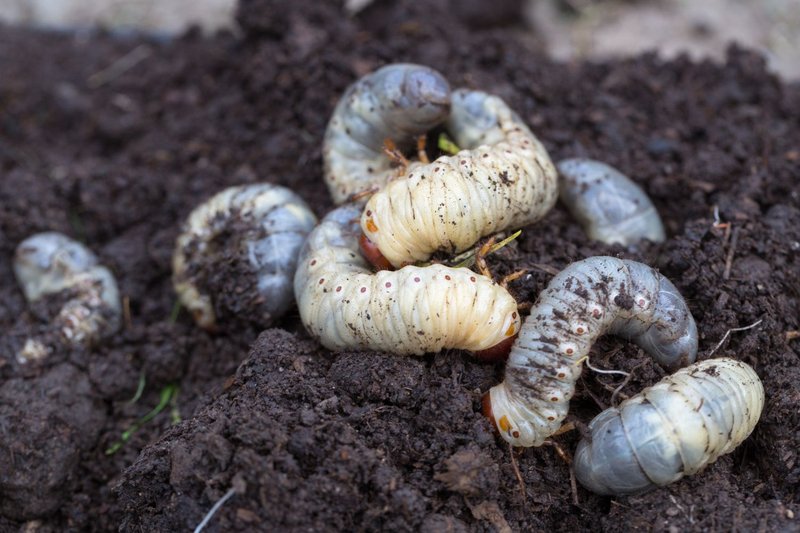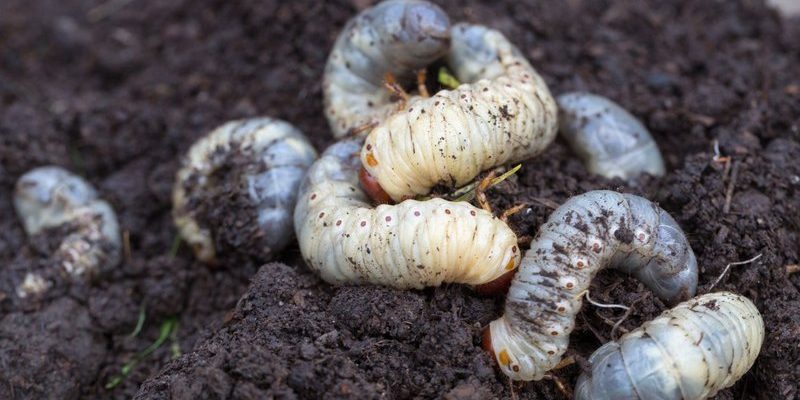
Let’s explore whether specific fertilizers lure in grub worms. Understanding this connection can help you make better choices for your garden or lawn. After all, it’s a lot easier to keep these pests at bay than to deal with the damage later on. We’ll break it down step by step, so you know what to look for and how to maintain a healthy garden.
What Are Grub Worms?
Grub worms are the larvae of various beetle species, including the Japanese beetle and the European chafer. These pests live underground, munching on plant roots and causing the grass to wilt or die. If you’ve ever noticed brown patches on your lawn or unhealthy looking plants, it might be due to these hungry critters. They thrive in warm, moist environments and can multiply quickly, especially if conditions are right.
These pests might seem small, but their impact can be substantial. The average grub worm can grow up to 2 inches long, and a single infestation can lead to extensive damage. As they feast on roots, the grass struggles to get the nutrients it needs, leading to a lawn that looks more like a desert than a lush green paradise. So, why does this matter in relation to fertilizers?
Do Fertilizers Attract Grub Worms?
Here’s the thing: not all fertilizers are created equal. Some can actually create a more inviting environment for grub worms. Organic fertilizers, for instance, can attract more insects than synthetic ones. The organic matter and nutrients in these fertilizers can enhance soil health, but they might also draw in pests looking for a feast.
When the soil is rich in organic material, it can create the perfect habitat for beetle larvae. You might be wondering if it’s worth it to use organic fertilizers despite this risk. That’s a valid question, and it really depends on your overall gardening goals. If you prefer to keep things natural without pesticides, you may want to be extra careful about the types of organic fertilizers you use.
Types of Fertilizers and Their Effects on Grub Worms
Let’s break down the primary fertilizer types and see how they relate to grub worm attraction:
- Organic Fertilizers: These include compost, manure, and bone meal. While they boost nutrient levels, they can also attract more pests if used excessively.
- Synthetic Fertilizers: These are chemically formulated and generally less attractive to pests. They provide a quick nutrient boost but can lead to soil health issues if relied on too heavily.
- Slow-Release Fertilizers: These gradually release nutrients over time and can be a good compromise, reducing the chances of attracting pests.
- Granular Fertilizers: These can sit on the soil surface longer, which might attract grubs if they contain organic ingredients.
Each type has its pros and cons, so it’s crucial to consider your garden’s specific needs. Honestly, think about what you’re looking to achieve—balancing pest control while ensuring your plants thrive is key.
Signs of Grub Worm Infestation
If you suspect that grub worms are invading your garden, look for these tell-tale signs:
1. Browning Patches: Grass that’s turning brown or looks dead could be a sign of grubs munching on the roots.
2. Easy Pulling: If you can easily pull up patches of grass, it could indicate that roots are being damaged.
3. Increased Wildlife Activity: Birds or raccoons digging into your lawn can be a sign that they’re after those tasty grubs.
4. Wilting Plants: In your garden, wilting plants that don’t respond to watering might signal a grub problem.
If you notice any of these signs, it’s time to take action.
Preventing Grub Worms with Smart Fertilizer Choices
So, how can you keep these pests at bay? The first step is choosing your fertilizers wisely. Here are some tips to consider:
– Choose Synthetic Wisely: If you’re worried about grubs, sticking to synthetic fertilizers can reduce the risk of attracting them. They’re quick and effective without the added organic matter that draws pests.
– Use Organic Sparingly: If you love organic options, use them sparingly. Always incorporate them with good practices, like crop rotation and maintaining healthy soil.
– Maintain Healthy Soil: Healthy soil creates a thriving garden. Practices like aerating your lawn and adding compost can help achieve this while keeping pests at bay.
– Monitor Your Garden: Regularly check for signs of grubs and act quickly if you spot them. The sooner you catch them, the easier they are to control.
Let me explain; if you’re proactive about your fertilizer choices and overall garden health, you significantly reduce the likelihood of dealing with grubs. Think of your garden like a healthy ecosystem—balance is everything.
What to Do If You Have Grub Worms
If you’ve confirmed that grubs are partying in your garden, don’t panic. Here are steps you can take to get rid of them:
1. Apply Natural Predators: Introducing beneficial nematodes can help control grub populations without chemical treatments.
2. Use Grub Control Products: There are targeted products designed to reduce grub populations. These can be effective but always read instructions carefully.
3. Dethatch Your Lawn: Removing excess thatch can help expose grubs and disrupt their life cycle.
4. Monitor Moisture Levels: Overly moist conditions invite grubs, so be mindful of your watering habits.
You may need to try a combination of these strategies for best results, but with patience and careful monitoring, you can regain control of your garden.
Final Thoughts on Grub Worms and Fertilizer Choices
In summary, yes, grub worms do seem to be attracted to certain fertilizers, particularly organic types. Choosing the right fertilizer is just one part of maintaining a healthy garden. It’s all about balance—using fertilizers effectively while keeping an eye out for pests.
Remember to monitor your garden regularly, choose your fertilizers wisely, and maintain healthy soil. It’s less about using one magic solution and more about creating an overall environment that discourages pests. With the right approach, you can enjoy a vibrant garden without grubs ruining the party!

